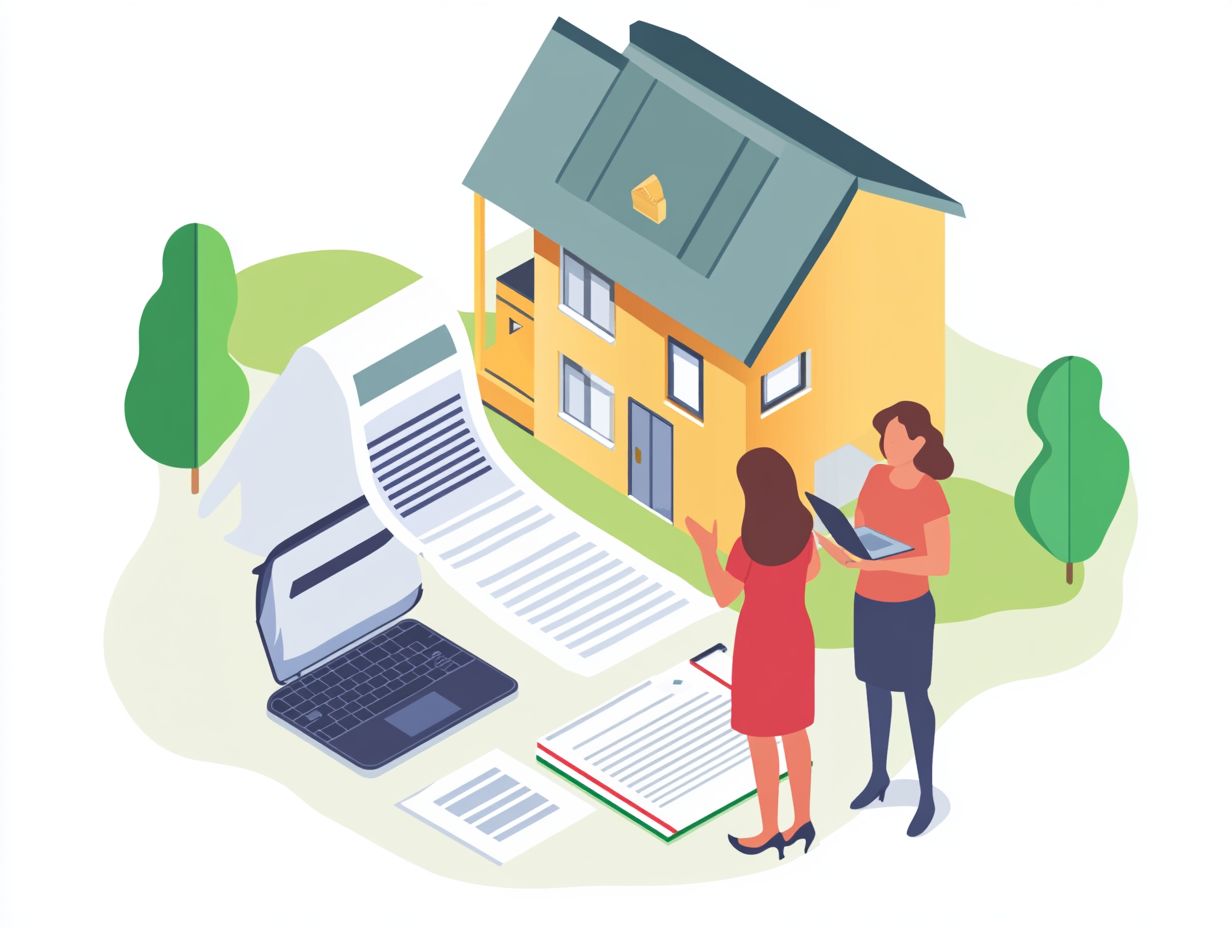5 Tips for Dealing with Home Insurance Adjusters
Navigating the realm of home insurance can be quite overwhelming, particularly when it comes to dealing with adjusters. Whether you’re filing a claim after a storm or assessing damages, grasping the nuances of working with home insurance adjusters is absolutely essential.
This guide presents five vital tips designed to help you maximize your claim and secure the fair treatment you deserve. From understanding your rights to identifying potential red flags, you’ll gain the insights necessary for a more streamlined claims experience.
Contents
- Key Takeaways:
- 1. Understand the Role of a Home Insurance Adjuster
- 2. Document Everything
- 3. Be Prepared for the Inspection
- 4. Know Your Rights and Coverage
- 5. Consider Hiring a Public Adjuster
- What Should You Do If You Disagree with the Adjuster’s Evaluation?
- What Are Some Common Tactics Used by Home Insurance Adjusters?
- How Can You Negotiate with a Home Insurance Adjuster?
- What Are Some Red Flags to Look Out for When Dealing with an Adjuster?
- How Can You Protect Yourself from Unfair Adjuster Practices?
- What Are Some Tips for Finding a Reputable Home Insurance Adjuster?
- Frequently Asked Questions
- What are the top 5 tips for dealing with home insurance adjusters?
- How important is it to understand my insurance policy coverage?
- Why is it important to document all damages?
- Is it necessary to keep track of all communication with the insurance adjuster?
- How can getting multiple estimates help with my insurance claim?
- What should I do if I am not satisfied with the first settlement offer from the insurance adjuster?
Key Takeaways:

Understand the role of a home insurance adjuster to better navigate the claims process and ensure a fair evaluation of damages.
Document everything, from before and after photos to receipts and communication, to strengthen your case and increase chances for a favorable outcome with the adjuster.
Prepare for the inspection by having necessary information and evidence on hand, and understanding the terms and conditions of your policy to effectively communicate with the adjuster. For first-time buyers, it’s also helpful to consider 5 tips for first-time home insurance buyers to navigate the process smoothly.
1. Understand the Role of a Home Insurance Adjuster
These professionals evaluate property claims, determine coverage, and negotiate fair settlements with insurance companies on your behalf when you face financial loss due to property damage.
The adjuster will meticulously assess the extent of the damage. They ll inspect various aspects of your property and gather important documentation.
This process involves not only appraising the damaged assets but also ensuring that thorough claims documentation is in place to substantiate your position.
Their expertise is invaluable in employing effective negotiation tactics. This ensures you receive compensation that genuinely reflects the true cost of repairs and losses.
By understanding your rights and leveraging the adjuster s skills, you can significantly enhance the claims process.
2. Document Everything
Proper documentation is essential in the claims process, providing the critical evidence needed for your property claim and significantly influencing the outcome with your insurance company.
To effectively strengthen your case, gather various types of documentation. Detailed photographs of any property damage are crucial, as these images serve as compelling visual proof during the evaluation.
Keep a log of recorded conversations with your insurance adjuster. This ensures that all communications are documented and can be referenced later should discrepancies arise.
Also, keep receipts for any repairs or temporary living expenses incurred while waiting for the claim to be processed.
Comprehensive documentation not only strengthens your case but also plays a pivotal role in facilitating a smoother and more accurate claims assessment.
3. Be Prepared for the Inspection
Get ready for the inspection! Being well-prepared can significantly shape the damage evaluation of your property claim, ensuring that every aspect of your loss is accurately assessed and documented.
Understanding what to expect during this important step can truly make a difference. When you present information about any damaged assets clearly and concisely, it allows the adjuster to quickly grasp the full extent of the situation.
Gather contractor quotes beforehand to make a strong case! This not only showcases your diligence but also provides crucial support during negotiations.
A bit of familiarity with basic construction concepts can elevate the conversation, giving you the power to address any potential concerns with confidence.
This proactive mindset establishes a positive tone, paving the way for a smoother evaluation process and potentially leading to a more favorable outcome for your claim.
4. Know Your Rights and Coverage

Understanding your rights as a policyholder and the intricacies of your insurance coverage is crucial for navigating the complexities of homeowner insurance and ensuring that your claim is treated fairly.
This means not only grasping what is included in your policy but also being aware of any common exclusions that could unexpectedly limit your coverage when you need it most.
Familiarizing yourself with the claims process is equally vital, as it lays out the necessary steps to take should a situation arise that requires filing a claim.
If you find yourself facing a claim denial, knowing your options and remedies can significantly influence how disputes are resolved.
Being well-informed about these elements gives you the power to advocate for your rights and pursue the compensation you deserve, ultimately leading to a more secure and confident experience in managing your insurance needs.
5. Consider Hiring a Public Adjuster
Hiring a public adjuster can offer significant advantages as you navigate the complexities of insurance claims, particularly when it comes to compensation expenses and potential disputes with your insurance company.
These professionals bring invaluable expertise to your claims process, adept at evaluating property damage and deciphering the intricacies of policy language.
By meticulously assessing the specifics of the damage, they can craft a comprehensive claim that underscores all eligible losses, significantly boosting your chances of securing a favorable settlement.
A public adjuster stands as your advocate, watchful for signs of insurance fraud while ensuring fair treatment throughout the process.
Their familiarity with industry standards helps them negotiate effectively, ultimately steering you toward a more favorable outcome, especially if you find yourself feeling overwhelmed by the complexities of insurance claims.
What Should You Do If You Disagree with the Adjuster’s Evaluation?
When you find yourself at odds with the claims adjuster’s evaluation, stay calm, but act swiftly to protect your rights as a policyholder.
Start by gathering all relevant documentation that supports your stance think repair estimates, photographs of the damages, and any correspondence you’ve had with the adjuster. Consulting with insurance professionals can also offer you valuable insights into industry standards and pricing, which can significantly strengthen your case.
Make it a point to familiarize yourself with the claims process, including deadlines and specific requirements. This knowledge protects you during negotiations.
When discussions with the insurance company arise, employ strategic negotiation tactics such as:
- Presenting your findings with confidence
- Keeping your cool, even in high-pressure moments
- Being open to compromises that still meet your expectations
By taking these steps, you position yourself as a knowledgeable and assertive advocate for your interests.
What Are Some Common Tactics Used by Home Insurance Adjusters?
Do you know the common tactics used by adjusters? Recognizing these practices can empower you. Home insurance adjusters often have a repertoire of tactics during the claims process that can significantly influence your claim assessment and the settlement amount you receive. To navigate this effectively, consider these 5 tips for navigating the claims process.
These tactics may involve minimizing damage evaluations to downplay the severity of your loss, which in turn impacts your settlement.
Adjusters might also push for quick resolutions, seeking to close cases before you fully grasp your entitlements. They may even record conversations to collect information that could be interpreted against your interests.
By being aware of such tactics, you give yourself the power to ask the right questions, insist on comprehensive assessments, and consult with independent experts professionals who can give an unbiased assessment of your claim when needed. This approach ensures that you receive a fair evaluation of your claims and are not shortchanged in the process.
How Can You Negotiate with a Home Insurance Adjuster?

Negotiating with a home insurance adjuster requires strategic skills and thorough preparation, including following 5 ways to prepare for a home insurance claim, to secure a fair settlement for your homeowner claims.
Start by compiling comprehensive records, which include detailed damage reports, repair estimates, and any other relevant paperwork. Understanding your policy coverage is crucial, as knowing what s included can significantly influence your negotiation outcome.
Maintain a professional and respectful demeanor during discussions; this fosters a better environment for negotiation. If the process feels overwhelming, don t hesitate to seek professional advice. Experts in the field can provide clarity and improve your chances of achieving a satisfactory settlement.
What Are Some Red Flags to Look Out for When Dealing with an Adjuster?
When dealing with an insurance adjuster, be vigilant for red flags that might indicate unfair practices or potential insurance fraud, which could jeopardize your property claim. For more guidance, check out these 7 tips for filing an efficient home insurance claim.
If the adjuster seems hesitant to share specific details about your coverage, that should raise concerns. Feeling unsettled or confused about your rights in such situations is natural. Similarly, vague explanations about the claims process should cause alarm.
If you sense pressure to accept a low settlement offer, take a moment to pause and reassess your position. To protect your interests, document all interactions meticulously, request clarifications in writing, and seek a second opinion from an independent expert or legal advisor.
This approach ensures your interests are thoroughly represented and protected.
How Can You Protect Yourself from Unfair Adjuster Practices?
To safeguard against unfair practices by insurance adjusters, remain vigilant and informed throughout the claims process. Understanding how to negotiate your home insurance claim settlement will help ensure your rights as a policyholder are upheld.
This involves meticulously documenting all interactions, as this can serve as vital evidence should disputes arise. Familiarize yourself with specific insurance rights and regulations applicable to your jurisdiction; this knowledge empowers you during discussions.
Maintaining emotional self-control during negotiations is essential, as staying calm allows you to present your case more effectively.
If you find yourself feeling lost in the complexities of insurance claims, consulting insurance professionals can provide insightful guidance and strategies tailored to your situation.
What Are Some Tips for Finding a Reputable Home Insurance Adjuster?
Finding a reputable home insurance adjuster is vital for ensuring a seamless claims process and securing a fair settlement for your homeowner insurance claim. It’s also helpful to follow best practices for working with home insurance providers.
To navigate the complexities of insurance claims effectively, start by checking the credentials of potential adjusters. Ensure they are licensed and certified in their field. Reading reviews from past clients can offer valuable insights into their reliability and professionalism.
Verify their experience, particularly with claims similar to yours, as this can significantly influence the outcome. Choosing an adjuster who genuinely advocates for your best interests not only builds trust but also enhances your chances of receiving the compensation you deserve.
Frequently Asked Questions

What are the top 5 tips for dealing with home insurance adjusters?
The top 5 tips for dealing with home insurance adjusters are: 1) Understand your policy coverage, 2) Document all damages, 3) Keep track of all communication, 4) Get multiple estimates, and 5) do not accept the first settlement offer.
How important is it to understand my insurance policy coverage?
Understanding your insurance policy coverage is crucial when dealing with home insurance adjusters. This knowledge helps you determine covered damages and ensures you receive appropriate compensation. Additionally, learning how to negotiate with home insurance providers can further empower you in the process.
For more resources or assistance, feel free to reach out or explore related articles on our site!
Why is it important to document all damages?
Documenting all damages is crucial. It provides evidence for your insurance claim.
Take photos and videos of the damages. Keep receipts for any repairs or replacements.
Is it necessary to keep track of all communication with the insurance adjuster?
Yes, tracking all communication with the insurance adjuster is essential. This includes phone calls, emails, and letters.
This ensures all discussed information is recorded accurately.
How can getting multiple estimates help with my insurance claim?
Getting estimates from several contractors helps you know the real costs of repairs. It also gives you better leverage when negotiating with the insurance adjuster.
What should I do if I am not satisfied with the first settlement offer from the insurance adjuster?
If you re not happy with the first offer, you can ask for a better deal. You can also get help from a public insurance adjuster, a professional who assists you with claims.

